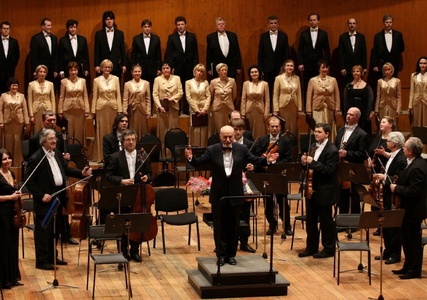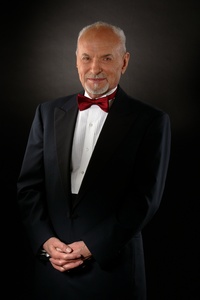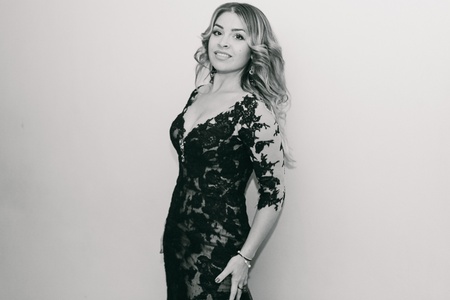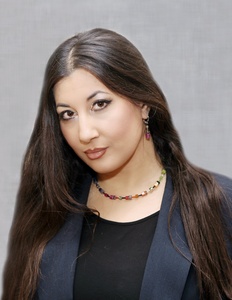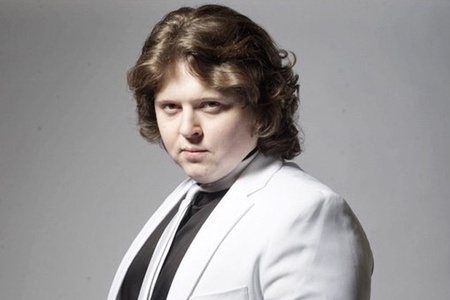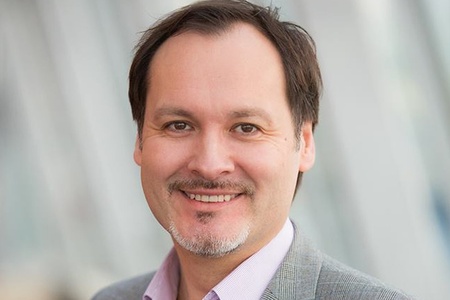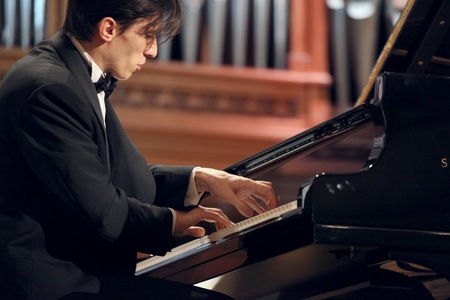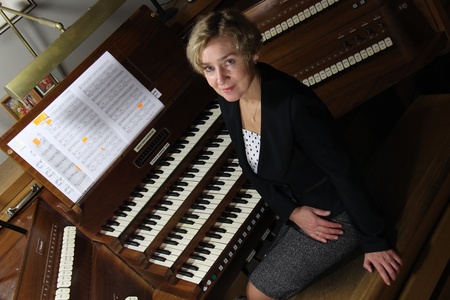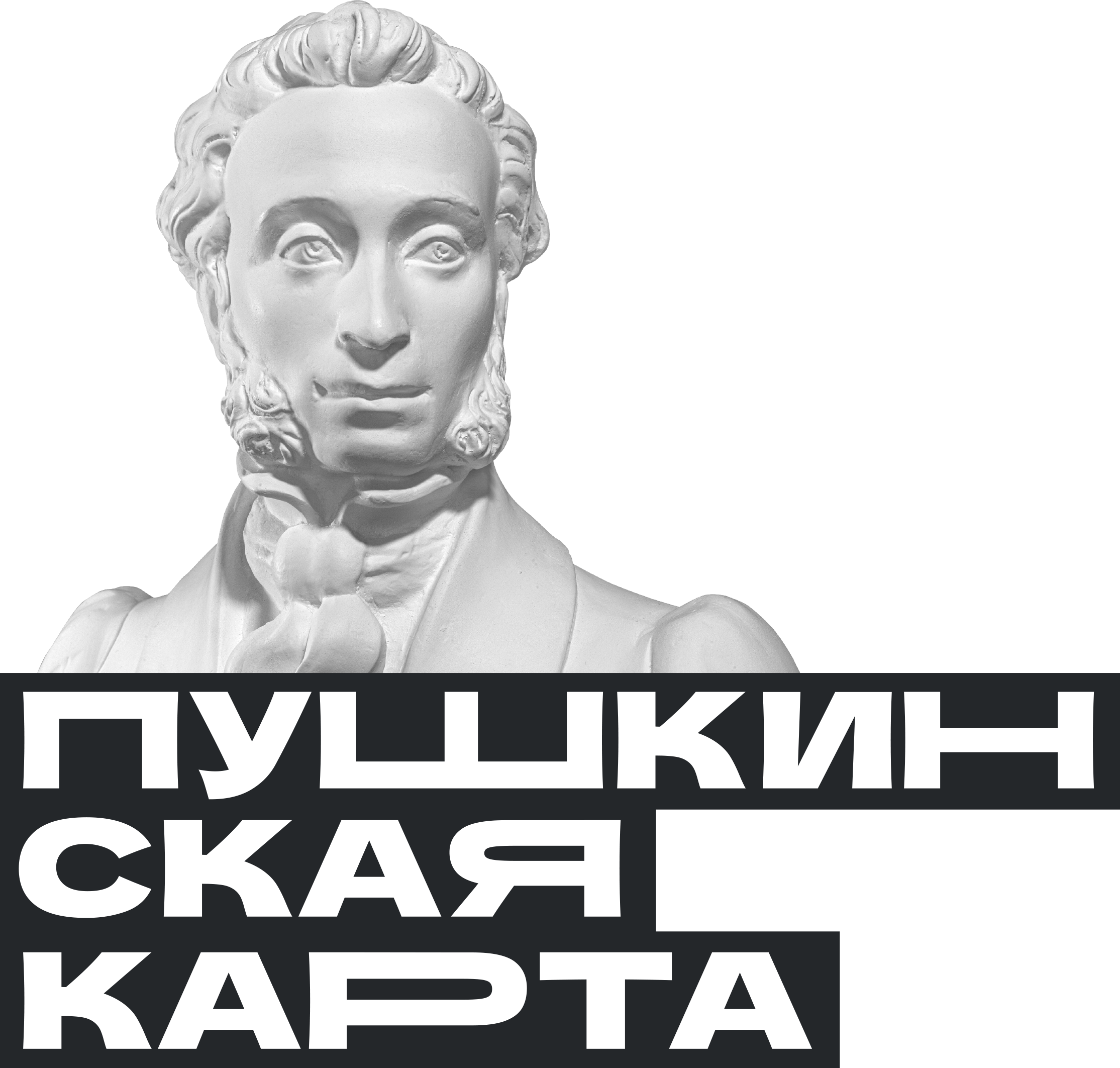Moscow State Academic
Chamber Choir, Vladimir Minin
October 11, 2017
Tchaikovsky Concert Hall
directions to the hallVideo
Get full access to services at your Personal Account page
Personal Account page:
- — exclusive videos
- — browsing history
- — personal playlists
- — mobile app and account sync
Already registered?
Account LoginMoscow Chamber Choir
Vladimir Minin, conductor
Alina Yarovaya (soprano)
Nadya Krasteva (mezzo-soprano)
Igor Morozov (tenor)
Askar Abdrakazov (bass)
Alexander Romanovsky (piano)
Marianna Vysotskaya (organ)
Program:
Rossini
"Little solemn mass" for Soloists, Choir, Organ and Piano

Subscription №42:
Moscow State Chamber Choir
Moscow Chamber Choir
The Moscow State Academic Chamber Choir was founded in 1972 by Artistic Manager and Chief Conductor, People’s Artist of the USSR, USSR State Prize Laureate, Professor Vladimir Minin who is at the head of the Choir up till now.
The Choir was born as antipode to official formal execution. There created a group capable to be collective “EGO” in its intercourse with audience, that is able to talk as outstanding personality while recounting about own feelings, events endured by the People, about its dreams and ideals, about concealed and significant matters.
Absolute feeling of harmony and dynamism of the modern world are peculiar to artistic temper of the Group.
World-wide known singers—Obraztcova, Arkhipova, Vedernikov, Sotkilava, Nesterenko appear with the Choir. The best Russian conductors—Fedoseyev, Spivakov, Pletnev, Sondetckys perform with the Group.
There are no composers in Russian choral music whose things wouldn’t be performed by the Choir. The repertoire of the Choir is very diverse. It consists of Russian classic music things (Rakhmaninov, Tchaikovskiy, Musorgskiy), Western-European classic (Bach, Mozart, Brams, Vivaldy), Russian folklore. Except a’capella things the Choir performs big-form works with an orchestra accompaniment as well as takes part in the opera productions—“Masked-Ball” by Verdy, “Iolanta” by Tchaikovskiy, “Bohemia” by Putchinni.
The spirit of the Group is not only in original and irreproachable manner of execution but also in fact that this particular Choir was the first during “the great stagnation” period revived the music of “prohibited composers” such as Chesnokov, Strumskiy, Grechaninov. The touring route of the Group ran through many countries and continents. Only for the last past years the Choir went on a tour to the USA, Switzerland (Zurich, Berne, Basel, Lucerne), Austria (Vena, Bregentze), Germany (Berlin, Kassel, Munich, Frankfurt, Potsdam), China (Pekin, Shanghai), Japan, Brazil, Portugal, Argentina, Italy.
For the time of creative work the Group was awarded many prizes including the title “Academic”. In 1999 Moscow and All Rus’ Patriarch Alexiy II for great creative merits and highest spirituality awarded V.N.Minin in honor of his 70th anniversary with sculpture of Holy Grand Duke Vladimir.
For the past years the Choir recorded 8 compact disks at such big Recording Companies as “Deutche Gramophone”, “Mazur Media”, “Eurodisk”, “Melodia”, and English Company NVC issued video cassettes with recording of Russian Church Music in the execution of The Moscow State Academic Chamber Choir.
Vladimir Minin
The artistic director and the main conductor of
the Moscow State Chamber Choir — National Artist of the USSR, the winner of the
State premium, Professor Vladimir Minin is one of the brightest musicians of
our country. He is invited by both Russian and foreign collectives for
preparation of the programs and realisation of “the foreman of classes.”
Vladimir Minin was born on January 10, 1929 in Leningrad. He graduated from the Leningrad choral school and in 1945 has got in the Moscow Conservatoire, where his creative activity has began in 1949, when A.V.Sveshnikov has invited Vladimir as a choirmaster in the State Academic Russian choir.
In January 1951 Vladimir Minin was nominated the artistic director and the main conductor of the Ensemble of songs and dances of the Soviet army in Poland, and in 1954 has got in the post graduate program of the Moscow Conservatoire.
From 1958 to 1963 V.Minin was the director of the State capella of Moldova “Doyna” and from 1965 to 1967 he was the artistic director and the main conductor of the Leningrad academic Russian choral “Glinka capella”.
In 1972 under Vladimir Minin’s initiative, working in that time as the rector of State musical-pedagogical Gnesin's institute, from the students and high school teachers was created a chamber choir, transformed in 1973 into a professional collective—the Moscow State Chamber Choir.
This is when his rare artistic gift with the special brightness and completeness was revealed. For rather short period of time, the Moscow Chamber Choir became one of conducting art collectives of the country.
The power of the genuine art under a person is boundless. Really funny makes you to laugh, authentic grief—to cry, resolution—to act, the truth—to believe. The genuine art ennobles a man, and it is impossible to oppose to such strength. Everybody who used to visit concerts of E.Mravinskiy, S.Rikchter is familiar with a sensation (feeling) when incomprehensible becomes clear, the mysterious appears, and you begin to feel yourself as a sounding and significant part (fraction) of the lofty and wise world harmony, when spirit of goodness is set in the hall and there arises the most important that the art may give—the brotherhood effect.
Exactly such atmosphere reigns at the concerts of V.Minin’s Choir. It is this particular aura which is necessary for life of the Group and its’ Conductor. They create such aura by their creative work. And the good arises the good.
Vladimir Minin is really Russian creator. The main in his creative work is ethic principle. He is the prominent creator who wields with the traditional instrument of his profession perfectly but also possesses with lots of secrets of his craft. For that in home press he is called “magician”, “wizard”, “sorcerer”. Creator stunning with breadth of sound recording, who has already invented a lot of unprecedented things, he never the less is always in the process of permanent search.
Vladimir Minin whatever he executed—from Monterverdy to Gershvin and Ravel, from famous singings to Stravinskiy and Sviridov—he never regards as of paramount importance the incredible technical mastership of his Group although such mastership by itself would constituted name and fame of its’ leader.
Paraphrasing the expression of famous Russian scientist one may say that Minin works for art and creates for people. His delicate intuition, feeling of epoch, style, temperament, indefatigable imagination, knowledge, culture—everything is given up to search of truth and goodness, to cognition of harmony. Namely such search for Russian painters was and remains the principal vital task. And Vladimir Minin settles the matter without trying to adjust the correct answer.
He is not only the choir master but also the pedagogical innovator whose training system is grounded on paradoxical for the Choir foundation—entire individual freedom of singing voice. Undoubtedly there will be written theoretical research on this subject and practical results could be seen already.
Chamber Choir—is a Group of Soloists, at that some of them transform to bright individuals. There is no stiffness, artificiality in sound—making that is so peculiar to most academic choruses. There is artistry, lightness, simplicity and there seems absolute unavailability of obstacles in overcoming the difficulties both proposed by a composer and brought forward by the Maestro. Somewhere in perspective one may dream about Choral Theater, birth of new genres and forms of choral musicmaking.
Minin’s Choir—is lively and militant art, new and strong sucker of life-tree capable to hold out in any fights for the right to serve people. And it is a great occasion for everybody who is in a position to appreciate the excellence to know about availability of such strength in our musical art. And Minin may also appreciate the excellence. That is why he and like-minded persons are in the state of permanent work. Plans, search, and tireless toil—today, tomorrow, always and up to exhaustion.
Alexander Romanovsky
Described by Carlo Maria Giulini as “extraordinarily gifted,” pianist Alexander Romanovsky is a riveting, distinct and subtle performer with an utterly engaging voice. Born in Ukraine in 1984, Alexander studied with his mentor Leonid Margarius at the Imola Piano Academy for fifteen years before continuing his studies at the Royal College of Music (London) with Dmitri Alexeev. At the age of seventeen, he won First Prize at the prestigious Busoni Competition in Italy.
Praised by The New York Times as “special, not just an extraordinary technician with a flair for colour and fantasy, but also a sensitive musician and lucid interpreter,” Alexander graces many of the world’s most prestigious stages in recital. Recent highlights include the complete Chopin Études in the Main hall of Amsterdam’s Concertgebouw; the Tchaikovsky Concert Hall in Moscow and the Great Hall of the Moscow Conservatoire; Accademia Nazionale di Santa Cecilia and Teatro Olimpico in Rome; Tokyo’s Asahi and Kioi halls; Chile’s Teatro Municipal; and Sala Verdi at Milan’s Conservatorio; as well as a performance with the Swedish Radio Symphony Orchestra under the baton of Valery Gergiev.
Romanovsky regularly performs with major orchestras throughout Europe, Asia and The Americas including the UK’s Royal Philharmonic, English Chamber, Hallé and Bournemouth Symphony orchestras; Italy’s Orchestra dell’Accademia di Santa Cecilia in Rome and Milan’s Filarmonica della Scala; Russia’s Mariinsky and Russian National orchestras and St. Petersburg and National philharmonics; Japan’s Tokyo and NHK symphony orchestras; Chicago Symphony at the Ravinia Festival; Pacific and Santa Barbara symphony orchestras; Costa Rica Symphony; and with the New York Philharmonic, under Alan Gilbert, at the Bravo! Vail Festival. He collaborates at a very high level with conductors such as Vladimir Spivakov, Valery Gergiev, Michael Pletnev, Vladimir Fedoseyev, Sir Antonio Pappano, Gianandrea Noseda and James Conlon.
Recent highlights include Brahms No. 1 at the Brescia and Bergamo International Piano Festival with the Royal Philharmonic Orchestra under Pier Carlo Orizio; Shostakovich No. 2 with the Bournemouth Symphony Orchestra and Victor Aviat; Liszt No. 1 with the Moscow Philharmonic and Yuri Simonov; Tchaikovsky No. 1 at the Teatro Colon in Buenos Aires; Prokofiev No. 3 with the Orquesta Sinfónica de Castilla y León under Andrew Gourlay; and a concert in honour of the late Claudio Abbado at the Colmar International Festival, performing Beethoven No. 5 under Vladimir Spivakov. Recent recitals include Casa da Música in Porto; the Tchaikovsky Concert Hall in Moscow; Teatro Manzoni in Bologna; and Istituzione Universitaria dei Concerti in Rome.
Highlights in 2019/20 included performances of Rachmaninov No. 3 with the Filarmonica della Scala and Myung-Whun Chung at the MITO Settembre Musica festival and in Verona and Muscat, as well as on tour in the Baltic states with the Russian National Philharmonic and Vladimir Spivakov; and his debut at the Royal Albert Hall in London playing Beethoven No. 5 with the Royal Philharmonic Orchestra and David Hill. Alexander will also for the first time perform the complete Beethoven Piano Concerti, returning to both the Pacific Symphony Orchestra and the Costa Rica Symphony under the baton of Carl St Clair.
Recitals include Musica Insieme Bologna, Amici della Musica di Padova, Unione Musicale Torino, Tchaikovsky Concert Hall in Moscow, Freiburg International Piano Series, Fondazione Accademia Musicale Chigiana, and his debuts at the Fondation Louis Vuitton in Paris and Spivey Hall, Atlanta; with repertoire including the complete Chopin Études, Beethoven Diabelli Variations, Brahms 7 Fantasien Op. 116, and the Bach Chaconne from Partita No. 2.
Alexander performs extensively throughout Italy, where he has lived since early childhood. In 2007, he was invited to give a concert at the Papal Residence in the presence of Pope Benedict XVI in celebration of the 110th Anniversary of Pope Paul VI’s birth. Since 2007, he has released five critically acclaimed albums on Decca: Beethoven: Diabelli Variations, Brahms/Schumann, Rachmaninov: Etudes-Tableaux and Corelli Variations, Rachmaninov: Piano Sonatas, and more recently Childhood Memories.
Alexander Romanovsky has held the post of Artistic Director of the Vladimir Krainev Moscow International Piano Competition since 2014.

